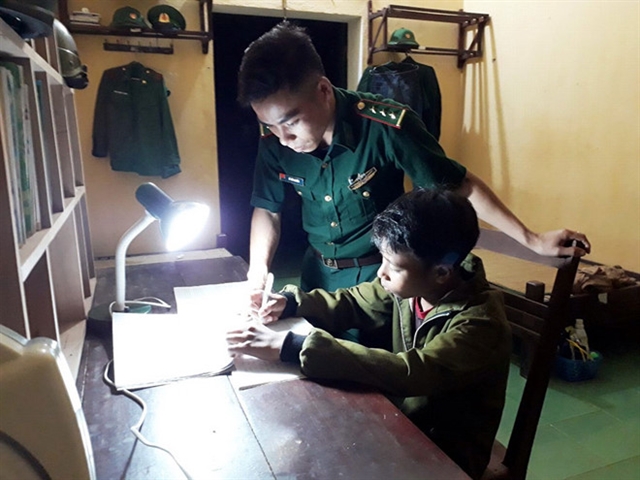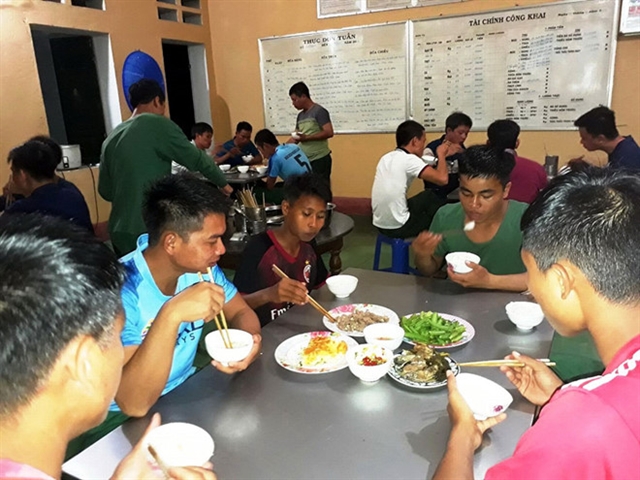 Society
Society

As well as patrolling the region, the guards have another responsibility, caring for orphans and disadvantaged children.

|
| A soldier from Mô Rai border guard station helps A Ben study. — Photo thanhnien.vn |
By Gia Hương
HÀ NỘI — Waking up at 5am may not be everyone’s cup of tea, but for some children in Kon Tum Province that morning alarm clock is music to their ears.
When the bells toll, they are up and at ‘em, ready for morning exercise with the team of border soldiers.
Teenagers A Bặc and A Ben are among 13 children fostered by the guard stations in the Central Highlands.
As well as patrolling the region, the guards have another responsibility, caring for orphans and disadvantaged children.
Thirteen-year-old A Bặc, a Giẻ Triêng ethnic child from Đắk Blô, Đắk Glêi District, doesn’t know who is his father. His mother can’t speak nor hear. They live with his grandmother who is 79 years old in a house of just 30 sq.m.
As they have only 100 sq.m of land for rice cultivation, the three-member family rely mostly on a monthly VNĐ400,000 (US$17) subsidy from the Government.
A Ben, also 13, a Rơ Măm ethnic youth in Sa Thầy District’s Mô Rai Commune is in a very similar situation.
His parents died when he was very small. He lives with his grandparents who are old and weak.
After school, A Ben follows his grandparents to cultivate maize, cassava and does other odd jobs to make ends meet.
Every day, A Ben has to walk more than five kilometres to go school. There are days he can’t because of floods.
But the lives of students like A Bặc and A Ben, another other children in the area, have changed dramatically since they were adopted by Đăk Blô and Mô Rai border guard stations in September this year.
Every day, besides school time, children enjoy recreational activities, physical training and sports with the soldiers.
They no longer have to worry about the things most take for granted like paying for food and studies.
Whenever the children have difficulties in class, the soldiers are on hand to help. They are taken to school and back home by motorbikes.
Each soldier is an uncle, or brother, providing the family support that has been missing from their young lives.
“Being adopted by the border guard station, I am very happy and grateful to the soldiers,” A Bặc said.
“I will try my best to study hard and strive to become a good cadre for my village when I grow up.”
Lieutenant Colonel Đặng Nguyên Hương of Đăk Blô Border Guard Station, said before implementing the model, the station’s leaders had worked closely with the local authority to find students from disadvantaged backgrounds.
“Since A Bặc was fostered, the station arranged accommodation and assigned personnel to help him with the study” he said, adding that officials and soldiers have contributed part of their salaries to pay for the programme.
Y Nghệ, deputy Secretary of Đăk Plô Commune’s Party Committee, said: “Without the support from the Đăk Blô Border Guard station, A Bặc would have to drop out of school because his family could not afford their schooling.”’
She believed that A Bặc would have better conditions for studying when fostered by the local border station.
The station is also supporting for another nine students with monthly assistance of VNĐ500,000 ($21.5), she said.
H Rách Láo, chairman of Mô Rai Commune’s People’s Committee said fostering was an effective model with humanitarian purpose.
“In addition to taking care of the lives of ethnic minorities in the border areas, the model also contributes to helping disadvantaged pupils to have better lives and can go to school like others, " he said.

|
| A Ben has dinner with soldiers at Mô Rai border guard station in Kon Tum Province. — Photo thanhnien.vn |
A Ren, A Ben’s grandmother, said he was touched and happy for what his grandson has received from the local border guard.
“I feel sad as I can’t see him every day,” he said.
“I know that it is impossible for my family to provide him with an adequate education but I hope he can become a border guard in the future.”
Currently, the Kon Tum Provincial Border Guard fosters 13 children in the locality.
Most of them are from ethnic minority families from disadvantaged circumstance, aged from six to 15.
When they are between 16-18 years old, they will enjoy the support from soldiers’ welfare programme named “Together we go to school”.
As many as 75 poor students have been assisted by the programme, said Colonel Phạm Cảnh Toàn, a political official from Kon Tum Province Border Guard Military headquarters.
He emphasised the importance of these initiatives in improving condition, livelihoods and access to education for ethnic minority people.
The implementation of such initiatives helped also promote the morality tradition of “the intact leaves protect tattered ones” - which express the tradition of sharing of Vietnamese people, he said. — VNS




